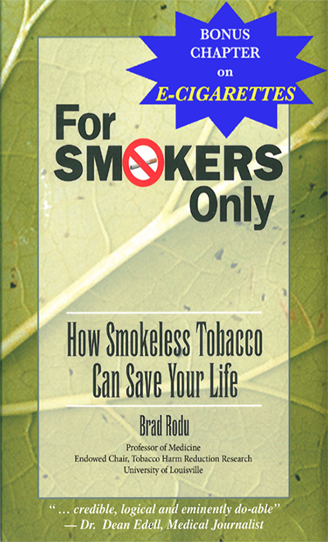Earlier this year, Medscape, which describes itself as “the
leading online global destination for physicians and healthcare professionals
worldwide,” invited me to participate in a series of short continuing medical
education (CME) programs on tobacco harm reduction (THR). Medscape clearly disclosed that the series
was sponsored by Philip Morris International, but the programs were firewalled;
faculty were not in contact with or influenced by the sponsor.
Topics included, among others, an examination of nicotine, and
the differential risks of combusted versus smoke-free tobacco/nicotine
products.
I recorded two programs.
The first, “Nicotine Misperceptions: What Does the Evidence Say,” was
published online by Medscape around March 1.
The second, in collaboration with Dr. Sally Satel, “Harm Reduction From
Tobacco: An Evidence-Based Discussion,” was published April 1. Dr. Satel also recorded a third program.
Following publication, a few anti-tobacco crusaders objected,
threatening “a rapid global boycott by healthcare professionals disgusted by
[Medscape’s] behaviour” in two British Medical Journal articles and one
in The Examination. I will not
provide links to these, as they include ad hominem attacks on me. Dr. Satel recounts the sorry tale in this article
(here).
As Dr. Satel notes, Medscape buckled, whining that “use of
this funder was a misjudgment that was out of character for Medscape Education
and that doing so may have disappointed our members.”
But were Medscape members truly offended by the PM
sponsorship? Evidence from an email I
received from a Medscape manager says “NO.”
Shortly after my nicotine program aired, I received an unsolicited email
from the manager titled, “One of the best CME programs I have seen in a long
time…” Following is the text of that email, with some passages highlighted by me.
“We have the preliminary results from your program that was
posted less than a month ago, and I am personally flabbergasted by the
participation - over 6000 learners and over 2200 test takers!
“The comments from participants have been incredible as
well:
- I can better educate and motivate pts on how to
cut down their use of nicotine products. I am also more cognizant now that
those who use cigarettes may have a more difficult time quitting. Will
refer these pts to our clinical pharmacist who can also help advise and
prescribe the appropriate tobacco cessation products.
- This was fantastic! This
down to earth harm reduction approach is absolutely key to help meet
people where they are, as nicotine addiction is so strong! Much
better outcomes can be achieved as these presenters described, using less
harmful forms of nicotine. As the doctors stated, there is a great need to
educate providers, and clarify misconceptions about nicotine vs various methods
of ingesting nicotine. I hope this presentation
reaches a wide audience! One of the best
continuing eds I have done in a while.
- Dispelled
many myths I previously held about nicotine that I will no longer
propagate.
- Thank you for bringing up such an important topic that
can bring down the costs of healthcare and truly improve the public health.
I am a psychiatric provider and have had a large
number of patients successfully quit smoking with harm reduction measures!”
It is tragic that Medscape capitulated to rabid tobacco
prohibitionists and stopped providing vital, life-saving information to health
professionals.











